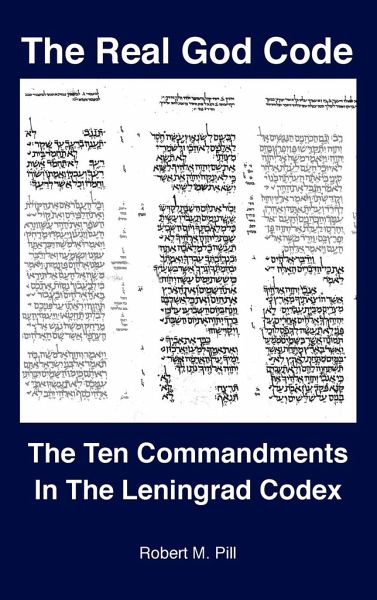
The Real God Code
The Ten Commandments In The Leningrad Codex

PAYBACK Punkte
12 °P sammeln!
This book is primarily a reference for the Ten Commandments as rendered in the Leningrad Codex, which is the oldest, complete manuscript of the Hebrew Language based Jewish Scriptures. The number of verses and the order in which they are written is unique to the Leningrad Codex. As of September 2019, I know of no other publications (Bibles, websites, etc.) other than my online Hebrew-English Tanakh (https://www.the-iconoclast.org/resources/tanakh/) which faithfully replicate the verse numbering and verse structure found in the Leningrad Codex! For instance, the well known King James Version us...
This book is primarily a reference for the Ten Commandments as rendered in the Leningrad Codex, which is the oldest, complete manuscript of the Hebrew Language based Jewish Scriptures. The number of verses and the order in which they are written is unique to the Leningrad Codex. As of September 2019, I know of no other publications (Bibles, websites, etc.) other than my online Hebrew-English Tanakh (https://www.the-iconoclast.org/resources/tanakh/) which faithfully replicate the verse numbering and verse structure found in the Leningrad Codex! For instance, the well known King James Version uses seventeen (17) verses in its rendering of Exodus 20 to express what is found in the actually source document, the Leningrad Codex in Exodus 20:1-12 (twelve verses). All other publications of the same material have similar discrepancies. Does changing the verse order and numbering potentially change the meaning of the text? When Yehovah (the name of God) personally enscribed the Ten Commandments on the two tablets of stone, and commanded Moses to place them in the Ark of the Covenant, do you think He intended them to remain unchanged in their replication (as in all Bibles)? If so, should we no all take Him seriously and hold those Ten Commandments in high regard ourselves? Might we consider that, in studying them, we may come to learn to comprehend that our own reason for being could be discerned by knowing what His words actually mean in the context they were given? If you consider this important, then you, too, may come to know and appreciate the Elohim (God) of Abraham, Isaac and Jacob by reading this book!













